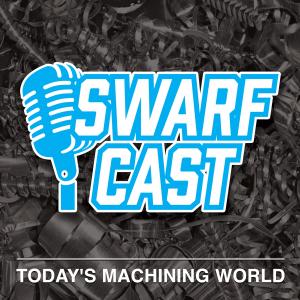Swarfcast

109 Years of a Machine Shop EP 138
On today’s podcast we’re telling the life story of F.C. Phillips in Stoughton, Massachusetts, a fourth-generation machining company that lived from 1911 until January of 2020. Our guest is Brian Snow, former co-owner of the company and a grandson of its founder, F.C. Phillips. I spoke to Brian about what enabled his company to last for over a century and what ultimately led it to shut its doors.
In addition to this podcast, Today’s Machining World produced a short documentary (below) about the history of the company, which is being auctioned off next week.
Scroll down to read more and listen to the podcast. Or listen on your phone with Google Podcasts, Apple Podcasts, Spotify, or your favorite app.
For much of F.C. Phillips’ existance, a significant portion of its revenue came from the athletic shoe spikes business. For a long time, it was the number one athletic spikes producer in the United States. In the early twentieth century the South Shore region of Massachusetts had a large shoe industry. F.C. Phillips’ first foray into the shoe business was around 1915, making threaded rods that went into shoe trees. A few years later, the company developed a specialty, producing metal spikes on Acme-Gridley screw machines for the bottoms of logging shoes as well as athletic shoes for a number of sports, golf shoes in particular. F.C., the company’s founder, patented a way for the spikes to be assembled, which led to the company not only producing the spikes but also the plates in the soles of the shoes in which the spikes screwed into. Unfortunately, many decades later, the athletic spikes business was devastated when golf course greenskeepers outlawed golf shoes with metal spikes, claiming they were tearing up their courses. Today only the pro golfers get to wear them. Also, when the bulk of shoe manufacturing moved to Asia it further hurt the athletic spikes business. However, up until F.C. Phillips closed in 2020, it was still making metal spikes for track shoes.
In addition to its athletic spikes business, F.C. Phillips had some great contracts over its 109 years. The company made parts for M16 rifles during the Vietnam war and had a very lucrative contract with General Dynamics in the ‘80s and ’90s, making fasteners that secured ceramic plates to the sides of Israeli army tanks. It also made parts for Snap-On and Hewlett Packard.
Brian started working at the company after college in the late ‘60s and retired five years ago as Vice President. I asked him why F.C. Phillips folded after being a successful business for over a century. He says the main contributing factors for its downfall were lack of investment in modern equipment and not pushing hard enough to get new customers.
It’s easy see an ending like that of F.C. Phillips through a negative lens. A business that made important components for so many people, including thousands of athletes, no longer exists, and many talented people have lost their jobs. But if you listen to the podcast, Brian doesn’t seem sad. He is definitely sentimental about his family’s legacy and the place he went to work for so many years, but he appears to have come to terms with the end of the company. He says he thinks his grandfather, F.C., would have been astounded that the company survived as long as it did. Most companies can’t claim to have lasted over 100 years spanning four generations.
Brian even says he had a lot of fun preparing for the shop’s auction. He discovered hidden treasures, such as a pristine 100-year-old anvil in the shop’s basement. He also enjoyed helping to make the documentary about the company, which perhaps has given him further closure. I highly recommend everyone check the video out. It’s everything you could want! Acmes, anvils, drone shots and lot of heart.
Question: What’s your favorite and least favorite thing about family businesses?
The post 109 Years of a Machine Shop EP 138 first appeared on Today’s Machining World.









 Visit Podcast Website
Visit Podcast Website RSS Podcast Feed
RSS Podcast Feed Subscribe
Subscribe
 Add to MyCast
Add to MyCast